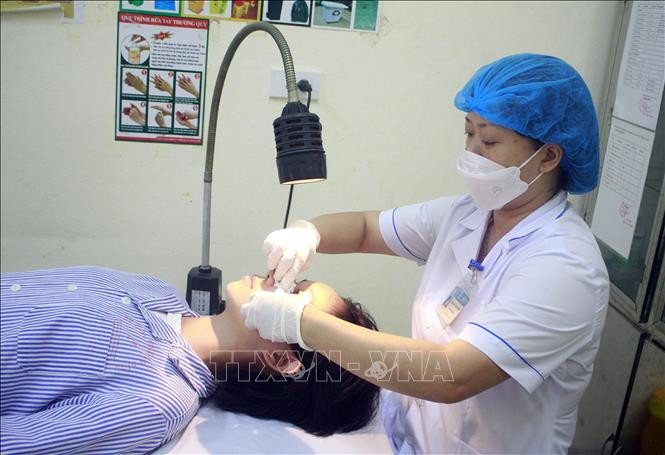Doctor's instructions on how to treat pink eye
People with pink eye should not buy eye drops on their own, and avoid using herbal medicine to apply or steam their eyes because it can cause other dangerous damage to the eyes.

Dr. Phung Thi Thuy Hang, Deputy Head of the Ophthalmology Department, Bach Mai Hospital, said: Acute conjunctivitis, also known as pink eye, is a common eye disease. Although it is quite benign and rarely leaves sequelae when cured, the disease is highly contagious and can cause large epidemics, especially in crowded places such as schools, hospitals, offices, swimming pools, etc., affecting the ability to work, study and live of the community.
Pink eye disease develops strongly in the summer because the hot and humid climate, lots of dust and pollution are favorable factors for pathogens.
Causes of pink eye can be due to: Bacteria, viruses, allergies; or giant papillary conjunctivitis associated with long-term contact lens use.
According to Dr. Phung Thi Thuy Hang, people with conjunctivitis often have symptoms such as: itchy eyes, red, gritty, photophobia, watery eyes and a lot of eye discharge. If there is a lot of discharge in the morning when waking up, it will make the eyelids stick together, making it difficult for the patient to open their eyes. Discharge also makes the patient feel difficult to see, but vision is usually not reduced. Usually at first, the patient only has one eye, after a few days it will spread to the other eye.
In people with pink eye, when examining the eyes, the eyelids will be red and swollen, the conjunctiva of the eyeball will be congested and edematous; there will be a lot of discharge (secretion) on the eyelid margin and conjunctival surface; in some cases there may be hemorrhage (bleeding) under the conjunctiva.
If the cause of the disease is streptococcus, pneumococcus, diphtheria... the conjunctiva of the eyelids is often covered by a pseudomembrane, when peeled off the pseudomembrane regenerates quickly. In severe cases, it can cause corneal damage such as: superficial punctate keratitis, punctate keratitis causing the cornea to become opaque, then vision is greatly reduced and lasts for months.
If the cause is Adenovirus, the patient may have a mild fever, runny nose, swollen lymph nodes in front of the ear or jaw angle, sore throat, and swollen tonsils.
Regarding the treatment of conjunctivitis, Dr. Phung Thi Thuy Hang recommends: Patients with conjunctivitis should go to ophthalmology clinics for diagnosis and advice on appropriate treatment methods; should not arbitrarily buy eye drops to avoid causing some dangerous complications.
In particular, patients should not use herbal medicine to apply or steam their eyes because it not only has little therapeutic effect but can also cause other damage to the eyes such as burns due to heat or essential oils, some fungi and bacteria in the leaves can penetrate through corneal scratches causing a very dangerous disease called corneal ulcer. At that time, treatment will be extremely difficult, costly and the consequences are corneal scars causing permanent vision loss, some severe cases have to remove the eye.
Accordingly, acute conjunctivitis rarely requires injectable antibiotics. Usually, doctors only prescribe antibiotic eye drops 5-7 times a day. If the patient has a fever, swollen lymph nodes, or rhinopharyngitis, oral antibiotics such as Cefixime, Augmentin, etc. can be used. Patients can wash their eyes with 0.9% saline solution several times a day to wash away eye discharge and pathogens to help the disease heal quickly.
Patients can use artificial tears 4-6 times a day to reduce discomfort.
Patients should also note that the use of eye drops containing Corticoid must be prescribed and monitored by an ophthalmologist in a few cases. If you use this type of medicine on your own, it can worsen the condition or cause dangerous complications. In cases of inflammation with pseudomembranes that make the medicine penetrate the conjunctiva poorly, the doctor will prescribe removing the pseudomembranes every 2-3 days. When the patient has a fever or pain, antipyretics can be used to relieve pain.
If you have allergic conjunctivitis, your doctor will prescribe antihistamine eye drops or other medications to help control inflammation. In severe cases, corticosteroids or antibiotics may be added when there is a secondary infection. It is necessary to eliminate the cause of allergic inflammation.
Doctors also recommend that people with pink eye should stop wearing contact lenses when they have acute conjunctivitis.
